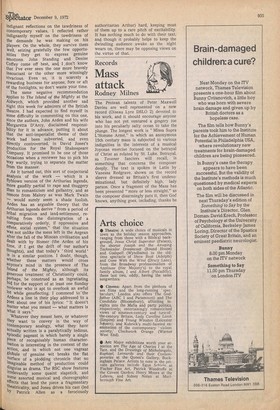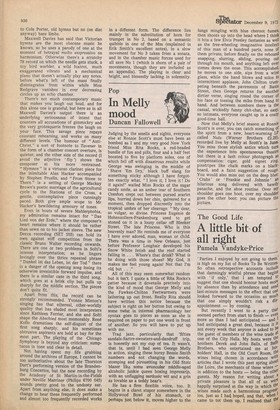Records
Mass attack
Rodney Milnes
The Protean talents of Peter Maxwell Davies are well represented on a new record (Oiseau Lyre DSLO 2) devoted to his work, and it should encourage anyone who has not yet ventured a gingery toe into his peculiarly salty ocean to take the plunge. The longest work is " Missa Supra L'Homme Arme," in which an anonymous 15th century mass is subjected to various indignities in the interests of a musical Joycean exercise focused on the betrayal of Christ as related by St. Luke. Betrayal, as Tavener fanciers will recall, is something that concerns the composer deeply. The text is spoken in Latin by Vanessa Redgrave, shown on the record sleeve dressed as Britain's first undenominational, but definitely high, lady parson. Once a fragment of the Mass has been presented " more or less straight," as the composer disarmingly puts it, then God knows, anything goes, including, thanks be to Cole Porter, old hymns but no (on disc anyway) bare limbs.
Maxwell Davies has said that Victorian hymns are the most obscene music he knows, so he uses a parody of one at the moment of betrayal mo/to esspressivo on harmonium. Otherwise there's a scratchy 78 record on which the needle gets stuck, a toy bird warbler, a wild foxtrot, much exaggerated vibrato and a mechanical piano that doesn't actually play any notes, before what's left of the mass finally disintegrates from within while Miss Redgrave vanishes in ever decreasing circles up an echo chamber.
There's not much contemporary music that makes you laugh out loud, and for this alone one is grateful, but here as in all Maxwell Davies's output there is an underlying seriousness of intent that counters all accusations of gimmickry and the very grotesquerie freezes the laugh on your face. This savage piece repays constant rehearsing, and works on many different levels. The humour of "Anti Christ," a sort of footnote to Tavener in the form of a chamber concert overture, is quieter, and the other side of the record (I avoid the adjective ' flip ') shows the composer at his more restrained.
" Hymnos " is a virtuoso clarinet piece for the inimitable Alan Hacker accompanied by Stephen Pruslin, and "From Stone to Thorn" is a setting of George Mackay Brown's poetic marriage of the agricultural cycle to the Stations of the Cross, a gentle, contemplative piece cunningly paced. Both give ample scope to Mr Hacker's bewildering armoury of tones.
Even in bouts of severe Mahlerphobia, my admiration remains intact for " Das Lied von der Erde," where the composer's heart remains where it should be rather than sewn on to his jacket sleeve. The new Decca recording (SET 555) can hold its own against stiff competition from the classic Bruno Walter recording onwards.
There are one or two problems in Solti's intense interpretation; as he lingers lovingly over the thrice repeated phrase " Dunkel ist das Leben, ist der Tod" there i3 a danger of the opening song losing its otherwise irresistible forward impulse, and there is a similar case in the third song, which goes at a brisk clip but pulls up sharply for the middle section. The pieces don't quite fit.
Apart from this, the record can be strongly recommended. Yvonne Minton's singing has that ethereal, other-worldly quality that has eluded most interpreters since Kathleen Ferrier, and she and Solti shape the Abschied most memorably. Rene Kollo dramatises the self-disgust of the first song sharply, and his sometimes obtrusive aspirants are held at bay for the most part. The playing of the Chicago Symphony is beyond any criticism: sumptuous in tone and clear in detail.
Not having spent my life grubbing around the archives of Europe, I cannot be too authoritative about the late Thurston Dart's performing version of the Branden burg Concertos, but the new recording by the Academy of St Martin-in-the-Fields under Neville Marriner (Philips 6700 045) sounds pretty good to the undusty ear. Apart from anything else, it does make a change to hear these frequently performed and almost too frequently recorded works in a different form. The difference lies mainly in the substitution of horn for trumpet in No 2, based on a semantic quibble in one of the Mss (explained in Erik Smith's excellent notes), in a slow movement for No 3 taken from a sonata, and in the chamber music forces used for all save No 1 (which is shorn of a pair of movements, though they are included as an appendix). The playing is clear and bright, and blessedly lacking in solemnity.











































 Previous page
Previous page